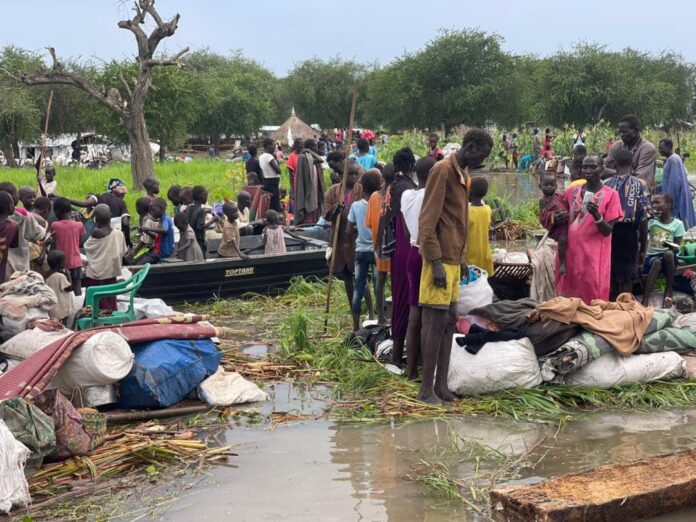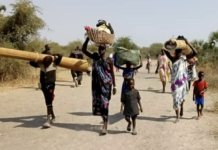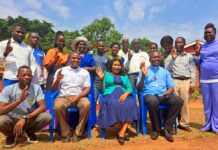In the remote Fangak County of Jonglei State, a devastating flood has upended the lives of hundreds of residents. Along the shores of the River Nile, families huddle together, their homes submerged beneath rising waters.
Women clutch their children, eyes scanning the horizon for signs of hope, while men, weary from days of struggle, navigate the treacherous waters in small, local canoes, salvaging what little they can from their once-thriving villages.
The floodwaters, relentless and unforgiving, have forced the community to evacuate, leaving behind everything they’ve ever known.
Commissioner of Fangak County Hon. Biel Butrus Biel, a figure of authority and compassion, stands amidst the chaos, his voice thick with concern. Hon. Biel said 6,000 persons displaced at Chotbora Quarter Council (Boma) under Old Fangak Town Council are in dire need of food, shelter, medicines, and non-food items.
This happened in the midnight of 27 August 2024. The population is about 6500. They are being evacuated to New Fangak Town by the County Government and partners.
“We continue to call on State-National Governments, the UN, and other humanitarian agencies to prioritize Fangak now than ever before.
Fangak is sinking and we appeal to those having humanity at heart to stand with the people of Fangak in their difficult moments of floods,” Biel said.
“Our people are suffering,” he says, his gaze fixed on the waterlogged landscape that was once a place of life and livelihood. “The situation is dire, and our efforts to protect our homes have been overwhelmed by the sheer volume of water.”
Local youth, determined to save their community, had worked tirelessly to construct dykes, battling day and night against the encroaching waters. But their efforts were in vain; the flood was too great, the river too fierce. The dykes crumbled, and with them, the last barrier between the people of Fangak and the devastating floods.
Now, with their homes destroyed and their lands submerged, the displaced residents of Fangak face a new set of challenges. Hunger looms large as crops are lost to the floods, and the threat of disease is ever-present in the stagnant, contaminated water that surrounds them. The children, especially, are vulnerable—exposed to the elements, without proper shelter, food, or clean water.
For many, the immediate future is uncertain. The floodwaters show no signs of receding, and the prospects for rebuilding seem distant.
Yet, amidst the despair, there is a quiet resilience. The community, though battered, remains united. They share what little they have, supporting each other in this time of crisis.
Commissioner Biel, despite the overwhelming challenges, is not giving up. He is calling for urgent humanitarian assistance to provide shelter, food, and medical care to the displaced. “We need help,” he urges. “Our people cannot survive this alone.”
As the sun sets over the flooded plains of Fangak, the river continues its inexorable rise, but the spirit of the people remains unbroken.
In the face of disaster, they cling to the hope that aid will come, that the waters will eventually recede and that one day, they will return to the land that was once theirs. Until then, they endure, bound together by the shared struggle to survive in the face of overwhelming odds.





